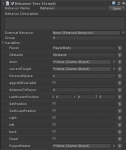ArgumentException: The value "null" is not of type "UnityEngine.GameObject" and cannot be used in this generic collection.
Parameter name: value
System.ThrowHelper.ThrowWrongValueTypeArgumentException (System.Object value, System.Type targetType) (at <ab1dc506f380448587ff80868d46ed83>:0)
System.Collections.Generic.List`1[T].System.Collections.IList.Add (System.Object item) (at <ab1dc506f380448587ff80868d46ed83>:0)
BehaviorDesigner.Runtime.JSONDeserialization.DeserializeObject (BehaviorDesigner.Runtime.Tasks.Task task, System.Object obj, System.Collections.Generic.Dictionary`2[TKey,TValue] dict, BehaviorDesigner.Runtime.IVariableSource variableSource, System.Collections.Generic.List`1[T] unityObjects) (at <9fd26eacf1af4bd8ab9b56956877bd65>:0)
BehaviorDesigner.Runtime.JSONDeserialization.DeserializeSharedVariable (System.Collections.Generic.Dictionary`2[TKey,TValue] dict, BehaviorDesigner.Runtime.IVariableSource variableSource, System.Boolean fromSource, System.Collections.Generic.List`1[T] unityObjects) (at <9fd26eacf1af4bd8ab9b56956877bd65>:0)
BehaviorDesigner.Runtime.JSONDeserialization.ValueToObject (BehaviorDesigner.Runtime.Tasks.Task task, System.Type type, System.Object obj, BehaviorDesigner.Runtime.IVariableSource variableSource, System.Collections.Generic.List`1[T] unityObjects) (at <9fd26eacf1af4bd8ab9b56956877bd65>:0)
BehaviorDesigner.Runtime.JSONDeserialization.DeserializeObject (BehaviorDesigner.Runtime.Tasks.Task task, System.Object obj, System.Collections.Generic.Dictionary`2[TKey,TValue] dict, BehaviorDesigner.Runtime.IVariableSource variableSource, System.Collections.Generic.List`1[T] unityObjects) (at <9fd26eacf1af4bd8ab9b56956877bd65>:0)
BehaviorDesigner.Runtime.JSONDeserialization.DeserializeTask (BehaviorDesigner.Runtime.BehaviorSource behaviorSource, System.Collections.Generic.Dictionary`2[TKey,TValue] dict, System.Collections.Generic.Dictionary`2[System.Int32,BehaviorDesigner.Runtime.Tasks.Task]& IDtoTask, System.Collections.Generic.List`1[T] unityObjects) (at <9fd26eacf1af4bd8ab9b56956877bd65>:0)
BehaviorDesigner.Runtime.JSONDeserialization.DeserializeTask (BehaviorDesigner.Runtime.BehaviorSource behaviorSource, System.Collections.Generic.Dictionary`2[TKey,TValue] dict, System.Collections.Generic.Dictionary`2[System.Int32,BehaviorDesigner.Runtime.Tasks.Task]& IDtoTask, System.Collections.Generic.List`1[T] unityObjects) (at <9fd26eacf1af4bd8ab9b56956877bd65>:0)
BehaviorDesigner.Runtime.JSONDeserialization.DeserializeTask (BehaviorDesigner.Runtime.BehaviorSource behaviorSource, System.Collections.Generic.Dictionary`2[TKey,TValue] dict, System.Collections.Generic.Dictionary`2[System.Int32,BehaviorDesigner.Runtime.Tasks.Task]& IDtoTask, System.Collections.Generic.List`1[T] unityObjects) (at <9fd26eacf1af4bd8ab9b56956877bd65>:0)
BehaviorDesigner.Runtime.JSONDeserialization.DeserializeTask (BehaviorDesigner.Runtime.BehaviorSource behaviorSource, System.Collections.Generic.Dictionary`2[TKey,TValue] dict, System.Collections.Generic.Dictionary`2[System.Int32,BehaviorDesigner.Runtime.Tasks.Task]& IDtoTask, System.Collections.Generic.List`1[T] unityObjects) (at <9fd26eacf1af4bd8ab9b56956877bd65>:0)
BehaviorDesigner.Runtime.JSONDeserialization.DeserializeTask (BehaviorDesigner.Runtime.BehaviorSource behaviorSource, System.Collections.Generic.Dictionary`2[TKey,TValue] dict, System.Collections.Generic.Dictionary`2[System.Int32,BehaviorDesigner.Runtime.Tasks.Task]& IDtoTask, System.Collections.Generic.List`1[T] unityObjects) (at <9fd26eacf1af4bd8ab9b56956877bd65>:0)
BehaviorDesigner.Runtime.JSONDeserialization.Load (BehaviorDesigner.Runtime.TaskSerializationData taskData, BehaviorDesigner.Runtime.BehaviorSource behaviorSource) (at <9fd26eacf1af4bd8ab9b56956877bd65>:0)
BehaviorDesigner.Runtime.BehaviorSource.CheckForSerialization (System.Boolean force, BehaviorDesigner.Runtime.BehaviorSource behaviorSource) (at <9fd26eacf1af4bd8ab9b56956877bd65>:0)
BehaviorDesigner.Runtime.Behavior.CheckForSerialization () (at <9fd26eacf1af4bd8ab9b56956877bd65>:0)
BehaviorDesigner.Runtime.BehaviorManager.EnableBehavior (BehaviorDesigner.Runtime.Behavior behavior) (at <9fd26eacf1af4bd8ab9b56956877bd65>:0)
BehaviorDesigner.Runtime.Behavior.EnableBehavior () (at <9fd26eacf1af4bd8ab9b56956877bd65>:0)
BehaviorDesigner.Runtime.Behavior.Start () (at <9fd26eacf1af4bd8ab9b56956877bd65>:0)
